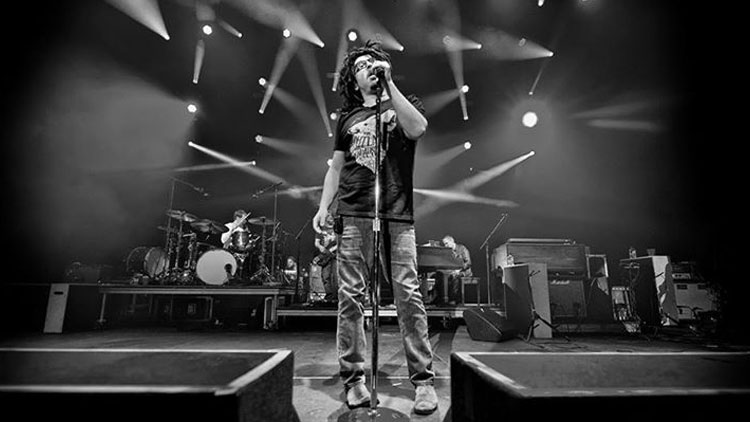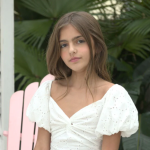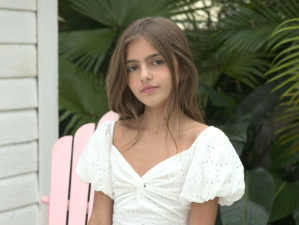By Kate Nalepinski
Counting Crows, the indie-rock band from the San Francisco Bay area, most notable for their hits, “Mr. Jones” and “Accidentally in Love,” are still going strong after 25 years. Before their upcoming performance at Nikon at Jones Beach Theater on Sunday, July 31, the Press spoke with Adam Duritz, the Counting Crows frontman. He talked about his deep love of music radio, “making it” in the music scene, tiny cardigans, Van Gogh and the hipster agenda.
Long Island Press: A major part of your band is the fan culture that follows you. They’re so interested in exchanging live recordings with other fans that you made it a key element on your website. Why is this so important to fans?
Adam Duritz: Because they’re exchanging them, it’s clearly important to them. Also, around the corner from where I’m sitting, there’s an entire wall of bootlegs that I have from other bands. If you love music, you can buy a band’s record. But there’s only so many of them, and once you got those, there’s nothing left. But my recordings are out there, and if you’re a band, your mission is to find more of those. I know how much I love that stuff, so I assume our fans do, too. I have an entire wall of other bands’ live recordings. And that stuff can’t harm you. If you’re good live, I think it’s a good advertisement for a live show.
LIP: You guys are most notable for your improvisation during your concerts. Each show varies. Do you think this furthers your appreciation of what you do?
AD: Yeah, and I also think it stops us from hating it. If you’re going to do something for 25 years, several hundred times, you wouldn’t want to do it the exact same way or you’ll hate it. And I don’t want to start to hate my songs because I really love them. But if they were all wrapped up in some obligatory package, where I had to play the same songs every night…There’s just no way I would love it. And I realized that early on. On the very first tour, I thought to myself, ‘I want to do this forever, but I know there’s no way I’m going to want to do it the exact same way forever.’ And then we started changing things up every time, from the beginning… I mean, you don’t ever come to a Counting Crows show where we’re phoning it in because we’re bored and we don’t want to play those songs that night. The truth is, if we don’t want to play those songs that night, we won’t play them. Since we’re doing exactly what we want to do, we’re totally into it every night.
LIP: What do you remember about the last time you played on Long Island?
AD: I think it was just last year. We played at The Paramount in Huntington, so it was recent. I don’t remember a great deal, but I’ll tell you what I do remember: Three or four years ago when we were at The Paramount, Mean Creek was opening for us, and we found a small sweater backstage. It was this small girl’s cardigan. And at first I thought it was Aurora’s, [Mean Creek’s guitarist] so I brought it to her, but it wasn’t hers. Then Sam, our drum exec, claimed it was his. He took his shirt off and he put on this tiny girl’s cardigan and pranced around the back of the stage. Every time I’m in The Paramount, I get this horrible memory of Sam, this bulky guy with a huge beard, in a little girl’s cardigan.
LIP: You are credited with writing all the lyrics to the tracks on Somewhere Under Wonderland, your most recent album, which was released in 2014. Where do you find your inspiration?
AD: Somewhere in my head. [He laughs.] It’s just all about how I feel. All true stories, in that it’s how I feel, but it’s not like they’re diary excerpts about exactly what happened. They’re often some combination of something that happened with what I’m feeling… None of the stuff on this album is stuff that actually happened. It’s more fiction based around real feelings.
LIP: Has being from the San Francisco Bay area influenced your sound? Do you think it contributes to your improvisation?
AD: Oh, I don’t know that anyone else was doing it. I guess the Grateful Dead were, but this is a different thing. Maybe the most important part, actually… When I was a kid growing up in the Bay area—and I know if you ask some other guys in the band from that area it’s the same story, this is something we all shared, whether we knew it at the time or not—there was a radio station called KSAM. It was the original, free-form, FM radio station. They played the [Rolling] Stones, followed by the Sex Pistols, P-Funk [Parliament-Fundadelic], followed by Miles Davis, followed by Elvis Costello, George Jones. They played every kind of music imaginable. So, for me, I grew up thinking rock and roll was just rock and roll. Music was just music. There wasn’t punk, alternative, classic rock, modern rock, jazz…It was just music. It broke my heart when I found out that there wasn’t anything like KSAM anymore… We grew up listening to music…just music. It was never “right” or “wrong” or “bad” or “cool.” Just music. I think that had an effect on a lot of the things we play.
LIP: Do you feel like this generation is different because they label themselves with certain genres to keep up or be hip?
AD: Ever since the days of Lester Bangs—a great writer about music—he loved music, but he also hated some music. And as much as he’d write a story about how he loved Van Morrison, he would write a story destroying James Taylor. While he was very knowledgeable about music, a lot of today’s music journalism has become about what sucks… Musicians really aren’t that way at all. Musicians just tend to like music. But a big part of fandoms and journalism, to me, is the idea of what is cool and uncool. After a while, if you’re all just wearing flannel and Doc Martens, you’re not Kurt Cobain! It doesn’t make you cool ’cause you’re dressing like that. And I saw Nirvana live. They’re fucking amazing, but it used to blow my mind that writers would talk about the latest fucking guy in flannel and Docs being cool, when he’s completely copying someone else’s thing! It’s repetitive. I guess a big part of journalism is making everyone cool. I mean, now we’re in that “reversed” part… Now, hipsters are uncool, and we call someone a hipster when they’re a dip-shit… By the way, there’s no quicker way of doing something than to have everyone doing it.
LIP: Are there any misperceptions about Counting Crows that you’d like to clear up?
AD: No! I’m sure there are millions of misperceptions, but I just don’t care. Whatever. It doesn’t matter. I’m sure people think we suck, which isn’t true since we’re amazing, but whatever. The records are all there. If you really want to figure something out about us, listen to our records. A bunch of the misperceptions is just people who listen to other people who tell them something and they believe it. I mean, if you listen to someone else that easily, you certainly aren’t going to be convinced by me. Nor am I interested in convincing you. People are going to say stuff about you—they’re going to say things about you—things that just aren’t you. They’re going to make something up because they don’t know you. But that’s life. There’s nothing you can do. It’s just part of being famous.
LIP: Is ignoring what other people say the best way of staying true to yourself? Or are you going to change naturally because of fame’s influence?
AD: Neither. I’m very interested in reading criticism of us. That doesn’t mean I think they’re right. It’s actually rewarding for someone to put so much thought into your art—I appreciate that. But by the time you’re reading about someone critiquing your work, that work is done, so it can’t affect it. To me, we’ve always done what we wanted to do… We’ve never worried about avoiding failures; we just do the things we love. Just go do the things you love… I think no one actually knows how to be successful. If you got yourself here just by doing what interests you, you should continue like that. I mean, if you listen to someone tell you how to be successful, it’s always what they did last time. Truth is, nothing is ever going to be successful in art. You should always just do the art for yourself… Van Gogh didn’t sell an entire painting in his entire lifetime. And his paintings are more expensive now than [almost] anyone else’s! So, at some point, he could have decided not to [paint]—go make shoes or something. But no one knows how to be successful, or what will [succeed in art]. It’s hard to see it as anything other than luck.
LIP: Do you feel like you’ve “made it”?
AD: The moment you do something you like. I don’t know what making it would even be. There’s a level we’re at that’s rare. There are plenty of bands that are more successful than us—Bob Dylan, The Stones, REM—but I’m not sure any of that has to do with making it. Take Alex Shulton—who’s a star now—but at the time, he was in a failed indie band. Did he make it? I don’t know what making it is. I mean, Van Gogh, like I said. That makes him the biggest failed indie band ever! Very early on in our career we played the Rock and Roll Hall of Fame ceremonies. I think we’re the only unknown band ever to play there. We played for Van Morrison because he didn’t want to come. So I started my career at the Rock and Roll Hall of Fame instead of ending it there, which is what you usually do. At the time, I was like, ‘Oh, this is what we’re destined for later!’ Now, I know we’re not going to get there, and I don’t care. First of all, we were all right there. [Laughs.] Second of all, I’m not sure the people who make those decisions, I don’t know if their opinions are important to me. I’m not sure anyone’s is, except for mine, or my friends, or my peers. I don’t know what “making it” is, but I think we made it.
LIP: Why did you choose to go down the music path?
AD: My mom hated this answer, but another reporter asked me once what I would be if I wasn’t in a band, and I said unemployed. I am a musician. When I was a kid, I didn’t know what I was wanted to do. When I was 18, I cut class one day and wrote a song. And every day after that, I sat at a piano and wrote a song. The moment I wrote that first song, it was like I mutated into something different. Like, I was a songwriter. Before that, I was a kid who didn’t know who I was. And I’ve always been a songwriter since. And it had been a while since I had any monetary success with that. But before any of my friends knew what I wanted to be in life, I knew I was a songwriter. I was ahead of them there, and then I kind of fell behind them when they all got jobs…But I leaped ahead when I became a rock star. Then I fell behind when they had kids and families. But, anyway, from that moment on, I knew I was a songwriter… I just do it because it’s who I am.
LIP: Do you ever think about what your life would be like if you weren’t involved in music?
AD: Yeah. Part of the fallout of having the success that I do have means there are other areas in my life that I left unattended. Relationships, families, those were things I didn’t have. Maybe I would have moved toward that earlier if it was a priority. But then, maybe I wouldn’t have done this. I think most about the relationships I would have had if I had forced myself to prioritize back then, more than in terms of jobs. But then again, I wouldn’t be here now.




























